Sci Heroines Unveiled
Sci-Heroines Unveiled: Celebrating International Day of Women and Girls in Science 2024
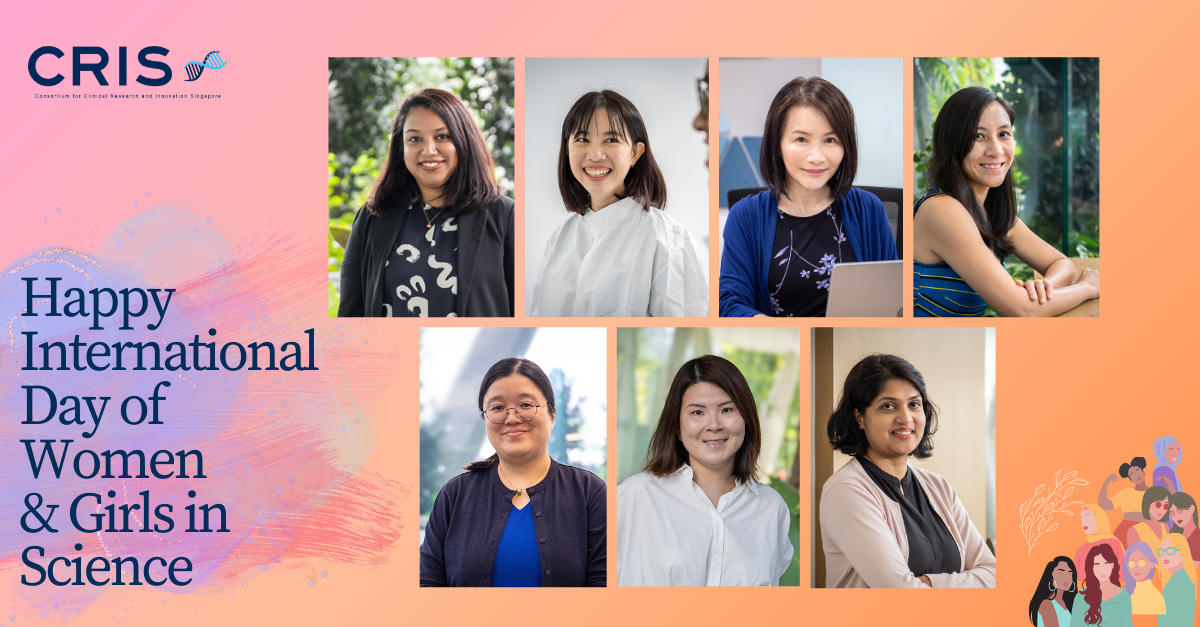
In the ever-evolving landscape of science and technology, the contributions of women have been pivotal in driving innovation and discovery forward.
As we commemorate the International Day of Women and Girls in Science 2024, we shine a spotlight on the female trailblazers who are not only excelling in their respective fields but are also paving the way for future generations.
This special feature delves into the lives and work of seven extraordinary women from CRIS, who are making significant strides in the realm of clinical research.
From enhancing quality control in cell therapy to leading the charge in cardiovascular health initiatives, these women are at the forefront of creating a positive impact in the world through science.
Join us as we unveil the stories of these sci-heroines, whose dedication, passion, and achievements exemplify the critical role women play in advancing scientific knowledge and innovation
Tan Siew Fong: Captain Quality Control
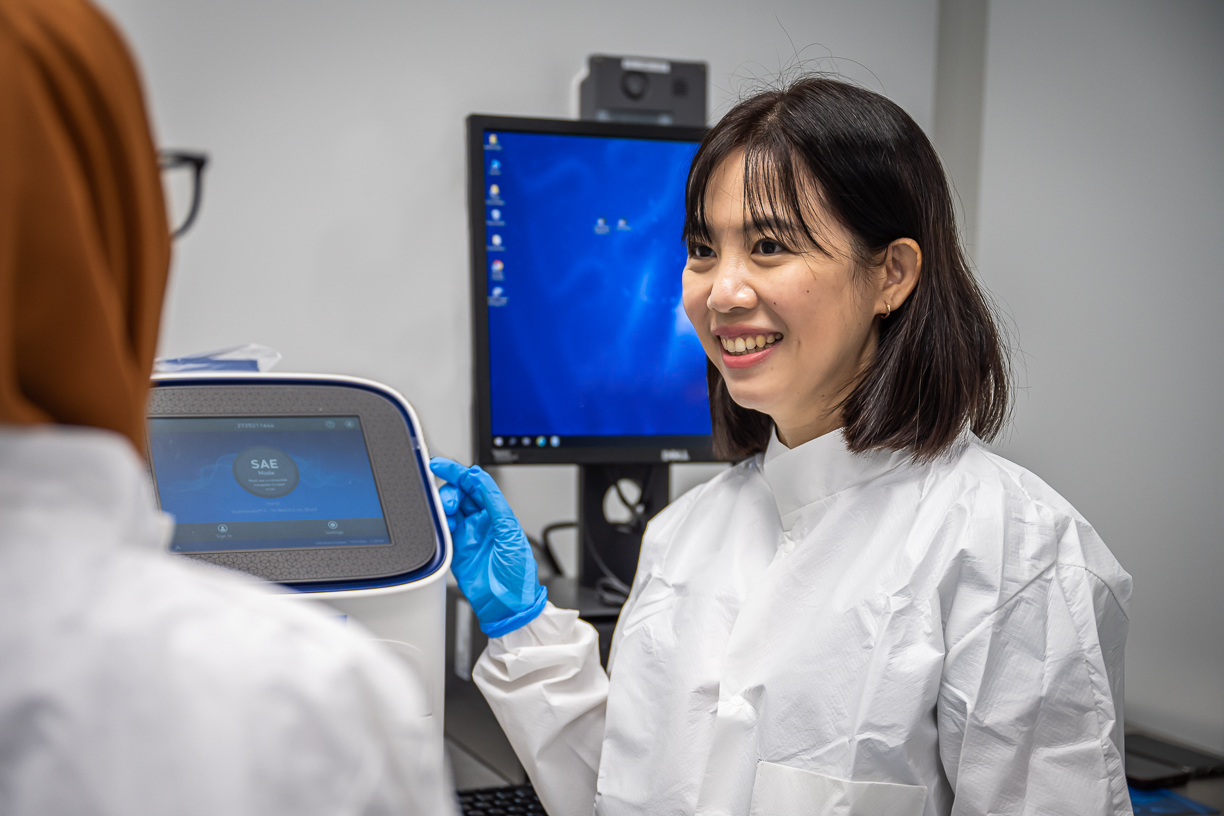
Meet Tan Siew Fong, a quality control laboratory manager at the Advanced Cell Therapy and Research Institute, Singapore (ACTRIS). At ACTRIS, Siew Fong oversees quality control processes and manages a team responsible for assessing product quality through vigorous testing and inspection before release.
ACTRIS aims to be the national and regional Centre of Excellence for discovery, process development and manufacturing of cellular-based therapeutics. In Aug 2023, ACTRIS opened a 2,000 sqm cell therapy facility to meet the increasing clinical demand for cell and gene therapy (CGT) treatments in Singapore.
Siew Fong emphasises the critical role of quality control in promoting the safety, reliability, and efficacy of medical interventions, ultimately contributing to positive patient outcomes. Citing a past clinical trial project where she witnessed the importance of product quality and its impact on patients, she shares that it helped her to gain a deeper appreciation of her vital role as a gatekeeper to generate accurate and reliable test results.
Siew Fong’s advice to young women who are interested in science is to pursue their passion actively, whether be it through conducting experiments, participating in fieldwork, or contributing to practical applications of scientific knowledge. She shares, “Our skills and contributions are also integral to the progress and advancement of scientific knowledge."
In the spirit of celebrating the incredible women in science, Siew Fong’s superhero alter ego is "Captain Perfectionist”, possessing powers to calibrate systems and solve complex problems with precision and speed. She envisions her superhero persona to be a combination of creativity and humour, infusing science-related humour into daily communications to cultivate a positive and creative atmosphere. By combining a sense of fun with a commitment to excellence, she envisions the lab to be a place where creativity, collaboration, and scientific precision coexist harmoniously.
She also treats her teammates with respect, guiding them with a firm and gentle hand, promoting collaboration and scientific rigor.
Lim Chew Gin: Bridging gaps between research and clinical trials
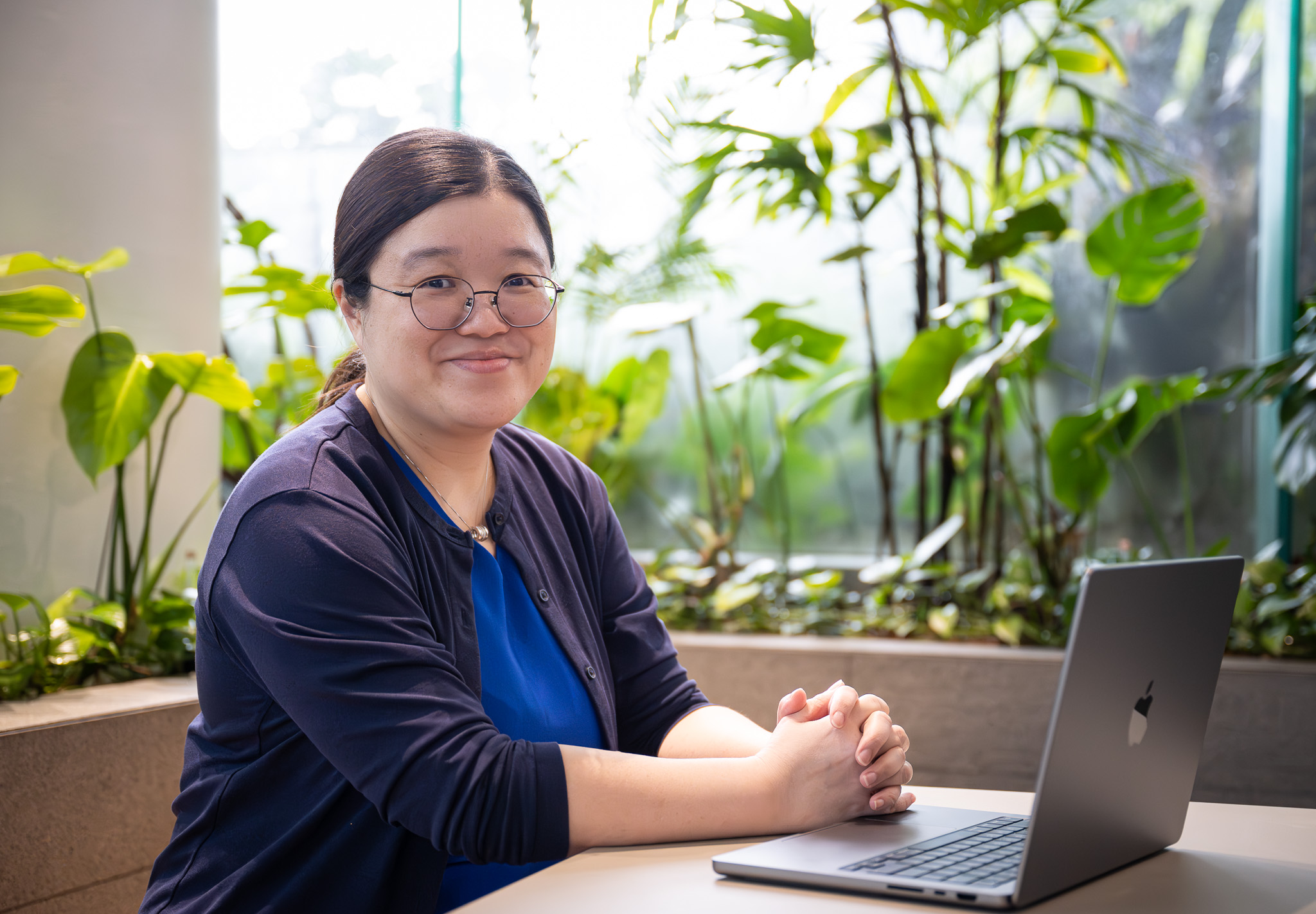
As the head of National Coordinating Body under the Singapore Clinical Research Institute (SCRI), Assistant Director Lim Chew Gin oversees multiple areas, from benchmarking Singapore’s clinical trial performance with other countries to identifying gaps within Singapore’s clinical trial ecosystem and devising strategies to address these gaps and enhancing processes.
In celebration of International Day of Women and Girls in Science, she notes that one strong attribute that women often bring to the table is their meticulous attention to detail and a collaborative mindset, enhancing teamwork and bringing diverse perspectives that enrich collaboration in the clinical research landscape.
As a leader herself, she fosters open communication and encourages collaboration among diverse teams in this multi-disciplinary clinical trial environment.
When asked if she has ever been inspired by a role model, she shares an early career experience where her supervisor encouraged her to take the lead, which resulted in the successful completion of a challenging project. It boosted her confidence as a young officer then, reaffirming her capabilities to drive negotiations independently.
Building on that positive experience, she hopes to encourage young women who are interested to enter the STEM field with a piece of advice – “Embrace your curiosity, trust your abilities, and persist in the face of challenges. Approach your journey with confidence and passion!”. In that same vein, she approaches life with the same vigour – be it in baking, cooking and food art, pampering her friends and family with her creations.
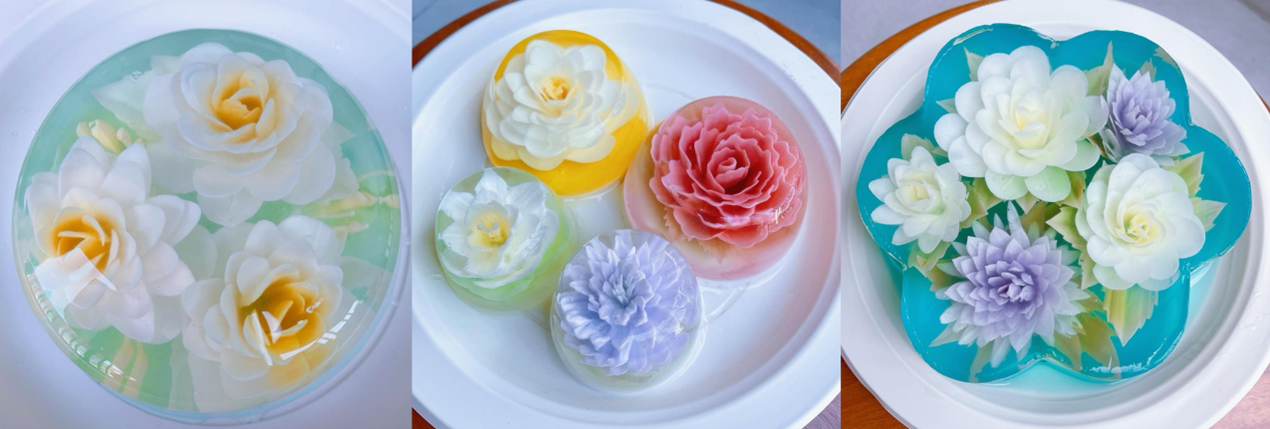
A selection of Gin’s culinary creations
When asked when keeps her motivated, Gin shares that being able to play a part in boosting Singapore’s clinical trial’s capabilities and bringing novel drugs and treatments to patients is significant and impactful, as it provides them with access to new alternatives, giving them hope when they have exhausted multiple options.
Tan Sock Hwee: Setting the pace for cardiovascular health
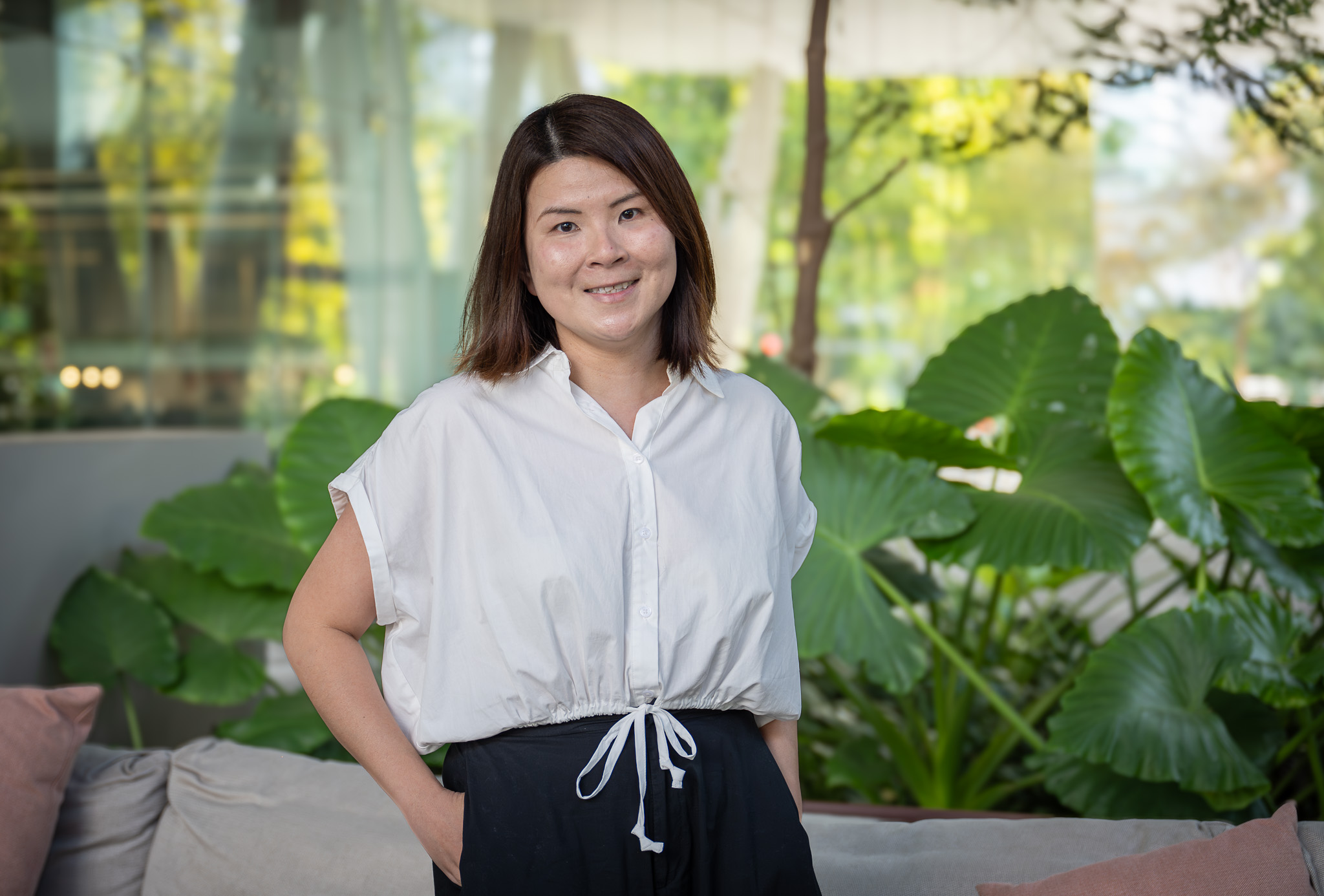
Tan Sock Hwee, Assistant Director of Strategic Planning and Development, leads and coordinates key initiatives for the Cardiovascular Disease National Collaborative Enterprise (CADENCE). As a national clinical translational programme, CADENCE aims to synergise cardiovascular research and technology capabilities across Singapore.
In her role, Sock Hwee evaluates the programme’s goals to ensure they align with long-term objectives to foster growth and sustainability. She collaborates with key stakeholders and plays a part in decision-making processes to facilitate strategic plans, driving the overall success of CADENCE.
Established in February last year, CADENCE comprises four national joint platforms focusing on data science, clinical trials, artificial intelligence/digital health, and a business intelligence and development unit to attract industry collaborations and external investments.
With a keen interest in conducting research in human health, Sock Hwee dedicated eight years to oncology research in Australia and returned to Singapore in 2014, where she shifted her research focus to cardiology. This transition marked a significant learning curve as she familiarised herself with new knowledge and terminologies in her new area of focus.
Motivated by the potential to make a tangible difference in people's lives, Sock Hwee finds immense fulfilment in her work. She recognises the pivotal role of the cardiovascular system in overall health and emphasises that advancements in this field can directly translate into improved outcomes for individuals facing heart-related challenges. The interdisciplinary nature of cardiovascular research also adds to its appeal as an interesting field of study, enabling a more holistic understanding of cardiovascular health through collaboration with experts in cardiology, genetics, bioinformatics, oncology, and other fields. One notable collaboration with cardiologists and bioinformaticians resulted in a publication in the Circulation journal, showcasing the impact of her work in identifying new candidates for biomarker and drug target discovery.
In her current role, she works closely with oncologists to investigate cardiac dysfunction related to chemotherapy and/or radiotherapy. She also explores partnerships with neurologists to delve into the intricate connection between heart and brain health. She shares, “Witnessing the tangible impact of our work (in clinical trials) which improves the well-being and quality of life of people is highly aspirational and brings a deep sense of fulfilment. The tangible impact of research on an individual's well-being is very real – especially in clinical trials.”
Sock Hwee attributes her interest in cardiovascular research to a personal experience involving her late father’s struggle with hypervolemia and heart failure. This profound experience ignited her passion to understand the complexities of the cardiovascular system and explore avenues for improvement.
For aspiring young women entering her field, Sock Hwee offers valuable advice: embrace failure as part of the learning process. In the world of science, experimentation is key, and not every experiment yields expected results. Rather than being discouraged by setbacks, see it as an opportunity to learn. Persevere through challenges, and success will follow.
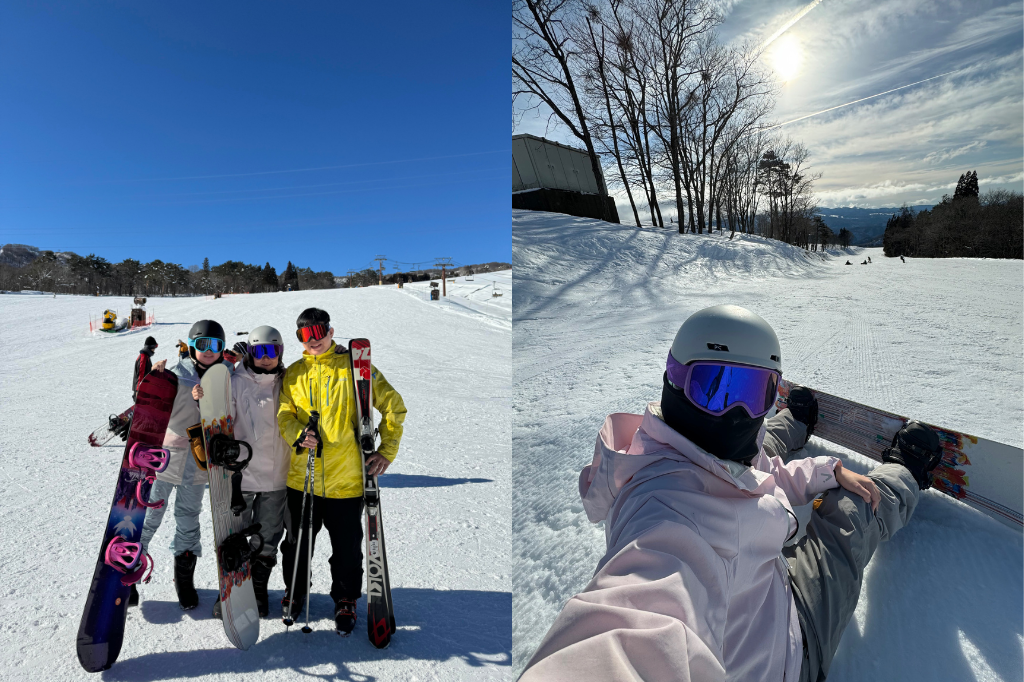
Outside of work, Sock Hwee finds time to live life to the fullest. During a recent holiday, she enjoyed time with her family and picked up a new skill – snowboarding. As she mastered the sport with her family, she realised that she had a talent for it. The ability to manoeuvre through snow, overlooking breath-taking scenery, gives her great joy.
Nimmi Baby: Advancing molecular research and translational cancer studies
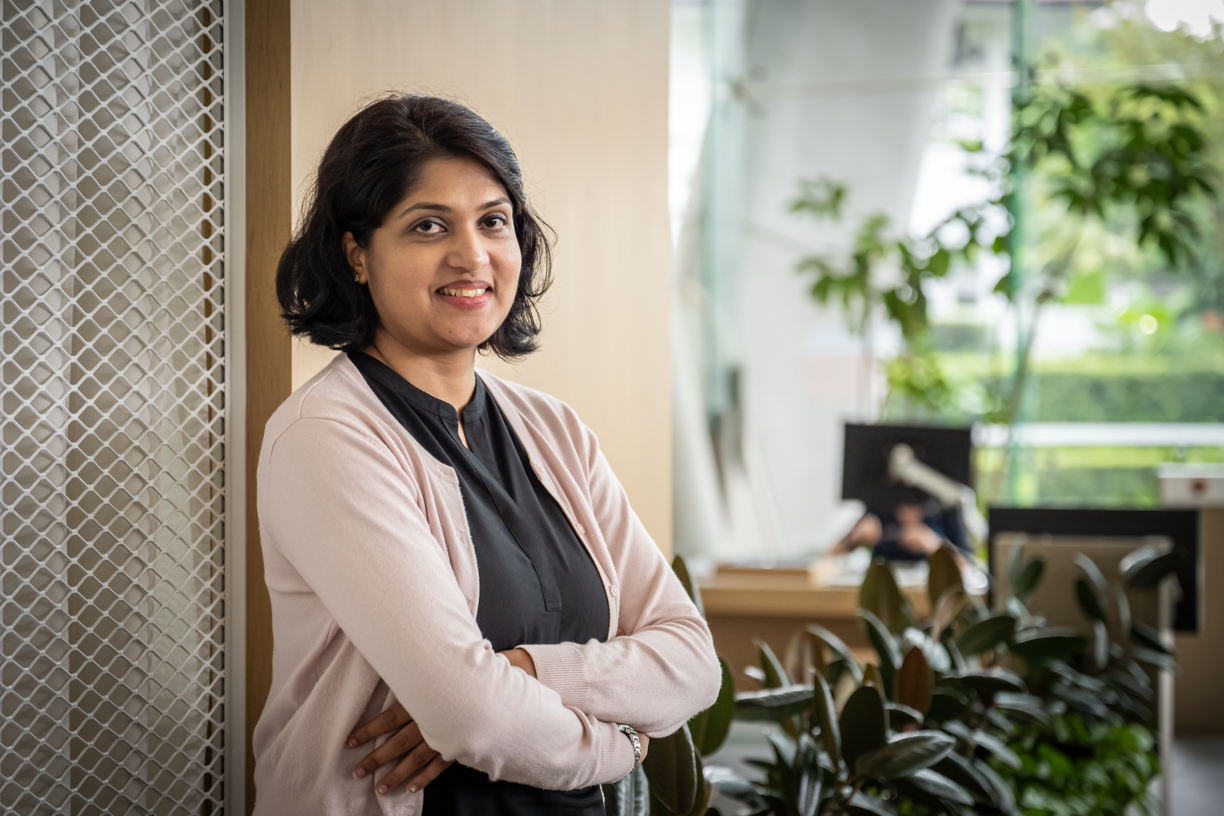
As a mum of two and project manager at the Singapore Translational Cancer Consortium (STCC), Nimmi coordinates multi-institutional translational cancer research across various institutes in Singapore. She helps facilitate end-to-end translational research studies from study initiation to molecular profiling at partner institutes, with a focus on ex-vivo tumour models.
Her role as a project manager entails coordinating collaborations among clinician scientists, researchers, and industry to bridge the gap between lab discoveries and real-world impact. As someone who enjoys learning, each project is a learning experience which leaves a significant impact on her, making her a more resilient person who welcomes new challenges.
Inspired by Nimmi, her eight-year-old daughter is an avid science lover who is enthusiastic about helping others. She often tackles questions from her inquisitive daughter about her job – where she explains that her job helps to facilitate research so that new drugs can be developed to help patients with cancer.
To young girls and women aspiring to enter her field, she encourages them to be curious. She emphasises the importance of believing in oneself and the impact that one can make in the world through science.
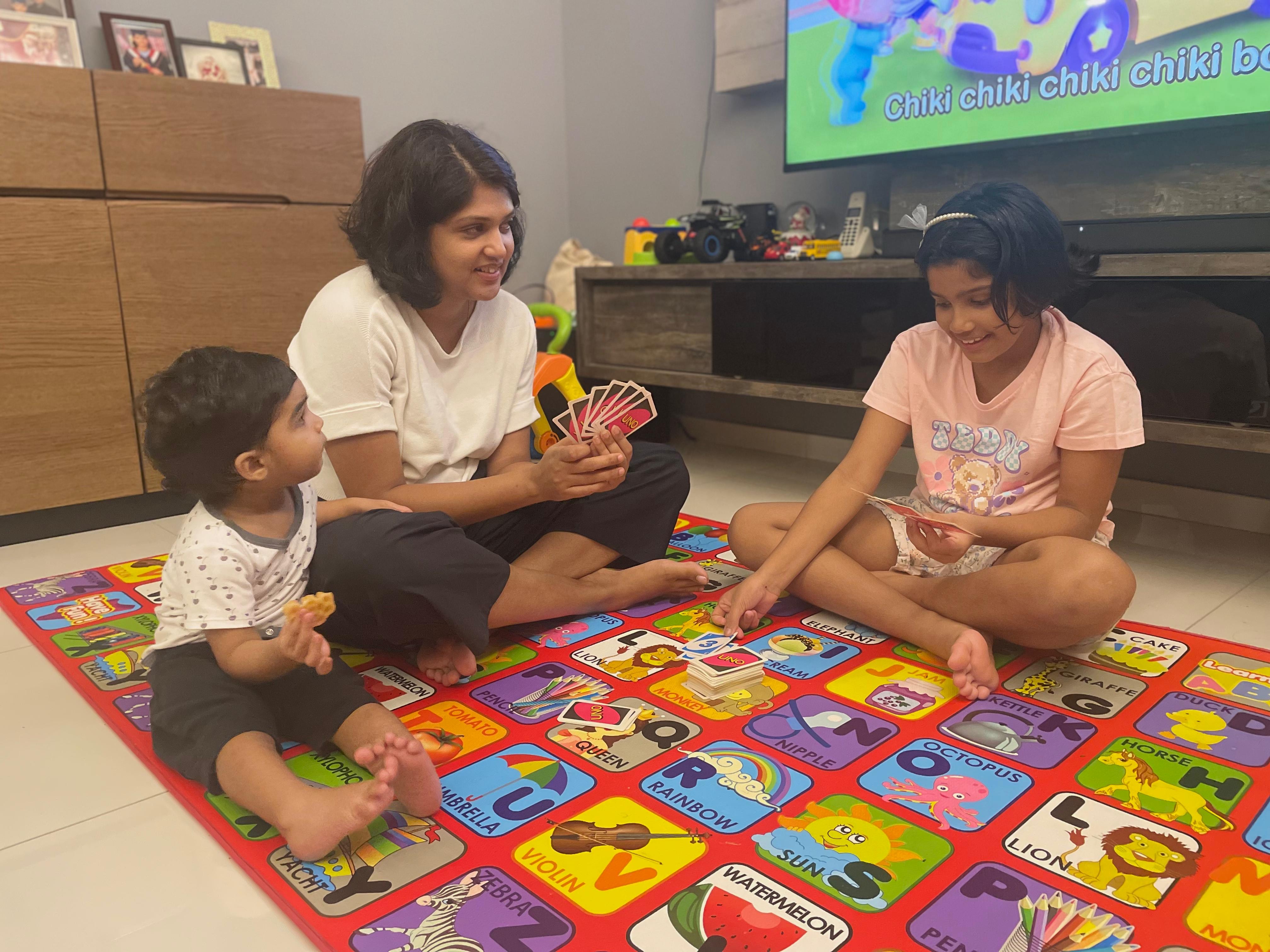
Nimmi spending quality time with her children, playing board games.
Nimmi finds fulfilment in creating a direct impact on improving people’s lives and contributing to the well-being of society. Outside of work, she spends quality time with her family, cycling and playing card games.
A superpower that she would like to possess is the ability to eradicate all diseases, especially paediatric cancers. As a mother of two, she hopes that all children can have a colourful life with their families, not in hospital wards but at home.
Florence Tan: Shaping corporate culture
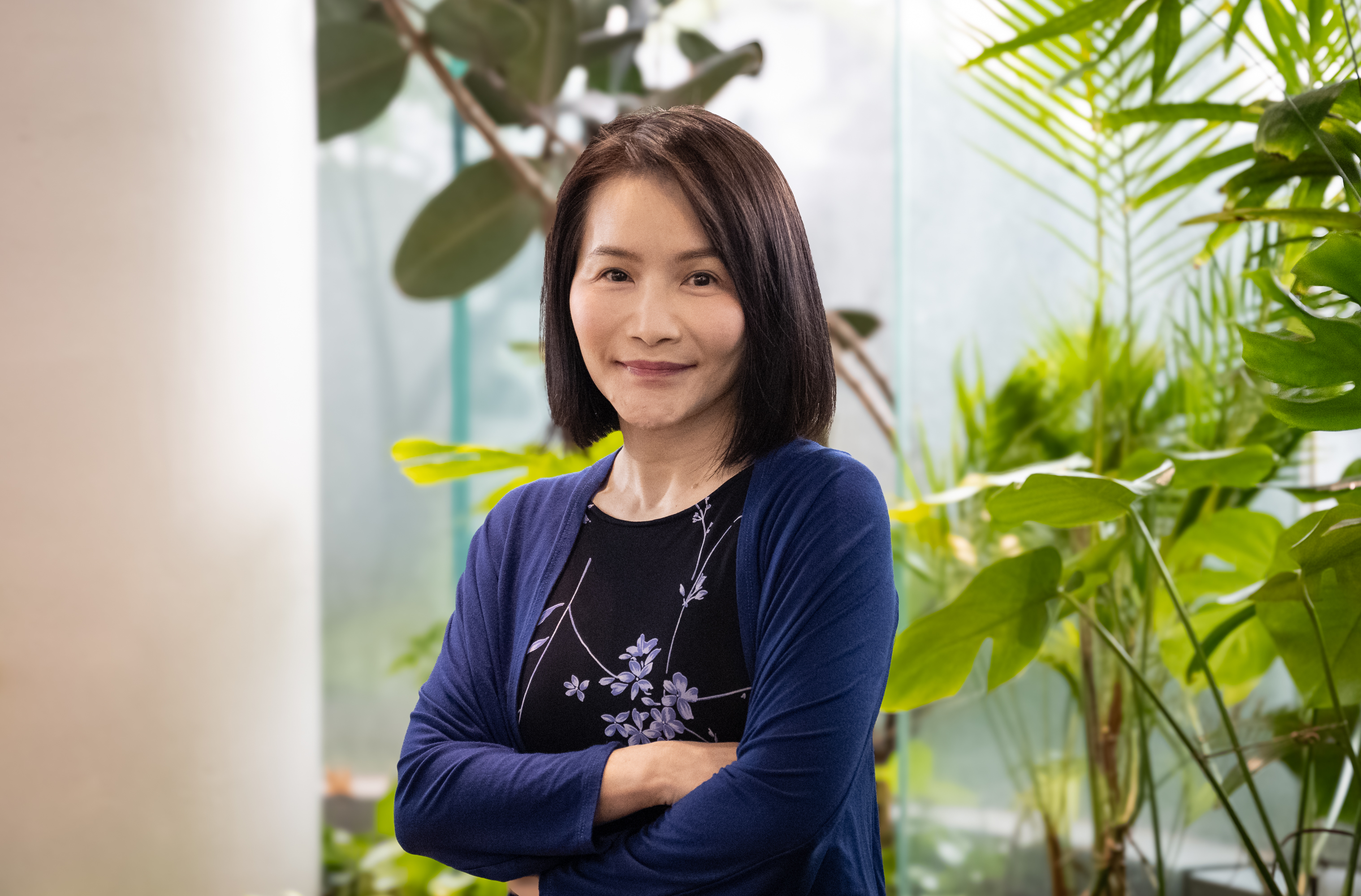
As the Chief Human Resource Officer at the Consortium for Clinical Research and Innovation Singapore (CRIS), Florence Tan leads the Human Resources (HR) efforts by overseeing the end-to-end employee life cycle and partnering with the leadership team to provide HR solutions to the organisation.
Having joined CRIS during the early years of its formation, she spearheaded the CRIS Culture Journey to shape a distinctive One-CRIS identity for employees through defining the company’s values, core competencies and providing a guiding framework for achieving corporate goals. As her very first end-to-end corporate values project, she considers it an enriching experience in her career.
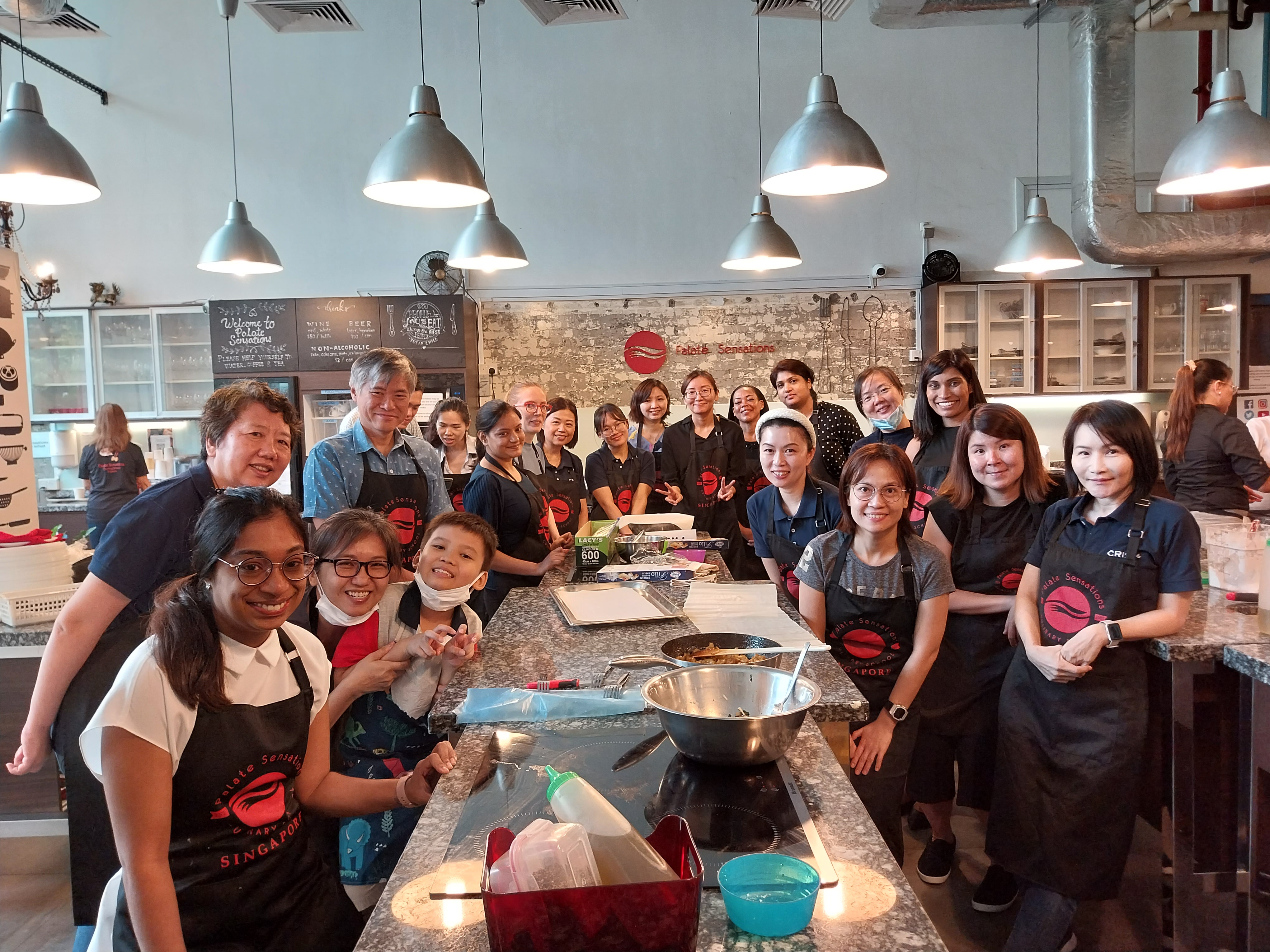
CRIS Values Teambuilding Workshop in Sep 2023
Her advice to young women aspiring to pursue life sciences is to actively collaborate, connect with mentors and like-minded individuals, and approach their journey with confidence and passion. “Constantly challenge yourself and don’t shy away from difficult concepts or solving complex problems. It is the perseverance and embracing of challenges that result in innovation and breakthroughs in science,” she advises.
She shares, “HR is about fostering human potential and building a better workplace to support business goals. You need to be passionate about people and have a natural empathy. It is about recognising the ability to make an impact at the workplace and culture, and influencing the way the organisation is built. While the changes you make may seem small, they may have a ripple effect, creating a bigger impact.”.
Important skills and qualities for a HR professional working in the field of science includes having a good understanding of the varied business needs and requirements to provide advice and HR solutions to support business goals. Besides knowledge of regulatory compliance, such as licensing requirements and industry standards, Florence also ensures that her team develops effective screening and interviewing techniques to assess not only technical skills but also cultural fit and soft skills. They also keep up to date with the latest tech trends such as the use of AI and its implications on new skills required of employees.
Florence’s inspiration for pursuing HR in clinical research lies in making a positive impact in the lives of others. She sees HR as a conduit for addressing humanity’s challenges, aligning with life sciences to create a voice of positive change and inspiration for a better future.
Doreen Low: Improving access to precision medicine
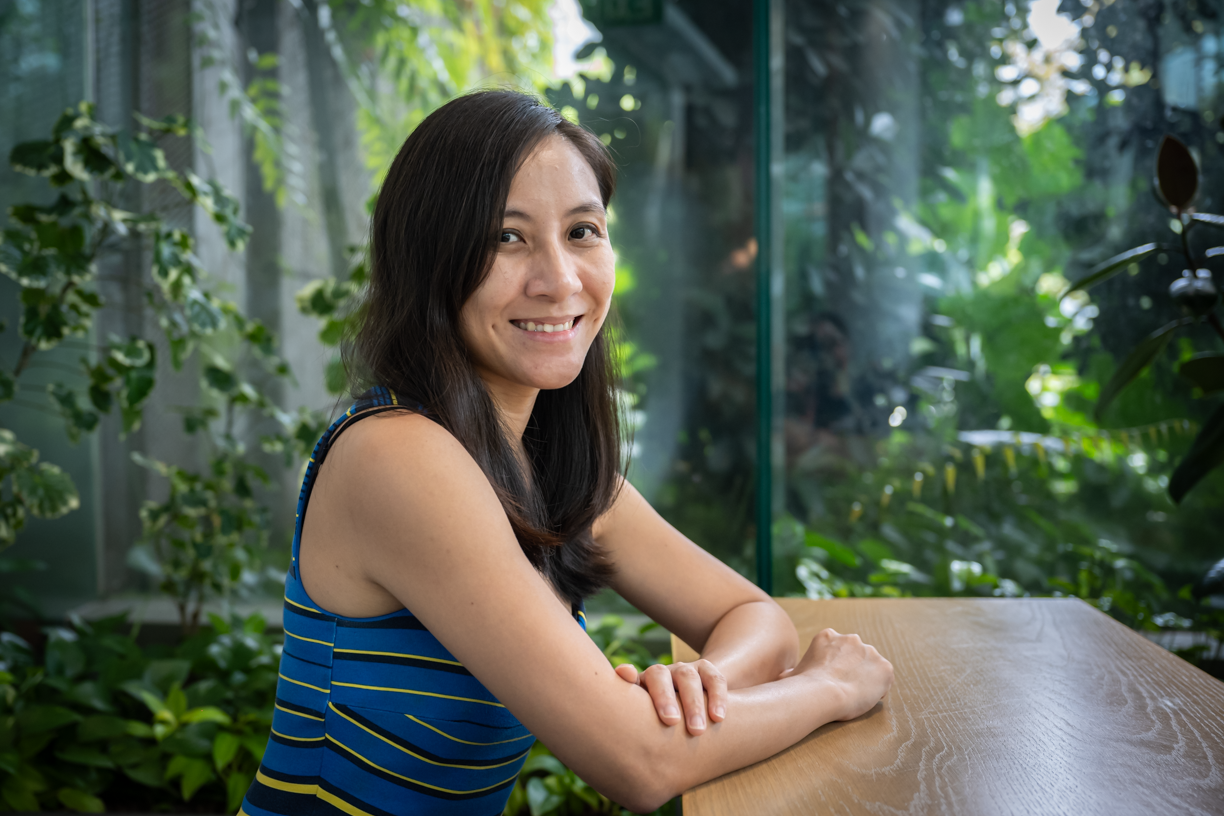
Leading clinical implementation under the Chief Medical Officer’s Office at Precision Health Research, Singapore (PRECISE), Doreen collaborates with the clinical community to identify and evaluate potential use cases for precision medicine and improve access to precision medicine for the local population.
PRECISE is the central entity in charge of implementing Singapore’s National Precision Medicine (NPM) programme to drive data-driven healthcare, improved patient outcomes and economic value at the national level. Doreen and her team oversee PRECISE’s Clinical Implementation Pilots, which aim to facilitate the incorporation of genetic/genomic tests into clinical pathways that improve patient outcomes, while maintaining sustainable per capita cost and optimising the healthcare experiences for both healthcare providers and patients, in line with Singapore’s RIE 2025 goals.
She shares, “Our office is starting to look at how we can meaningfully involve the public and patients as co-researchers in clinical implementation projects for precision medicine. It is important that their voices be heard and have a hand in shaping future implementation so that it can be relevant and useful to them.”
Doreen draws inspiration from historical female scientist Ada Lovelace, an English mathematician and writer who is also regarded as the world’s first computer programmer. She shares, “An interesting collaboration with Ada Lovelace would be to leverage her brilliant mathematical talents with modern day databases to develop algorithms to identify individuals who will benefit from precision medicine.”
Active listening is an essential aspect of her daily routine, helping her gain a deeper understanding of stakeholder perspectives and develop impactful solutions – a tip for aspiring girls and women pursuing careers in science.
Outside of work, Doreen is a nature enthusiast who enjoys hanging out at parks, beaches – basking in the sun and feeling the wind in her face.
Smitha Velayil Sunildeep: Steering biomedical technology projects
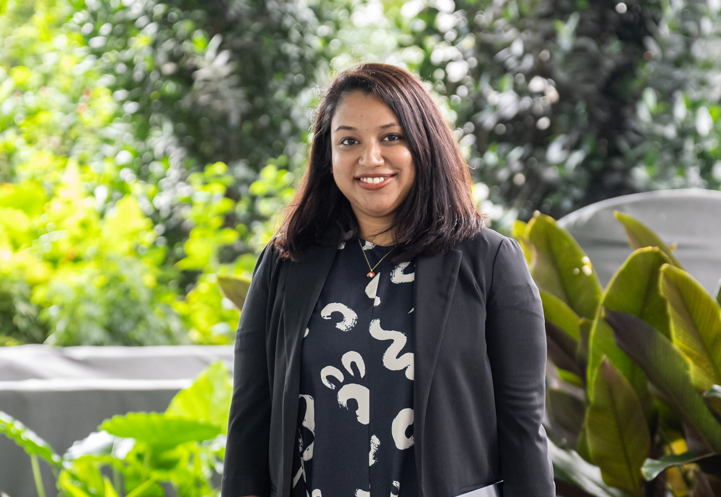
As an Innovation and Enterprise Manager at the National Health Innovation Centre Singapore (NHIC), Smitha Velayil Sunildeep manages biomedical technology projects from the public healthcare institutes towards commercialisation for health and economic impact. She also manages the community and international activities to strengthen NHIC’s support for these institutes in Singapore and beyond.
With a dual masters degree in biotechnology and business administration, Smitha has been engaged in translational and synergistic partnership development activities for innovative and interdisciplinary big data projects, university-level strategic biomedical cluster, and biofilms and microbiomes commercialisation over the last decade. These experiences have helped her to gain an all-encompassing outlook which informs her current role at NHIC that includes the catalysis of national healthcare commercialisation efforts.
As an advocate for multi-functional opportunities for women in Science, Technology, Engineering and Mathematics (STEM), Smitha shares that the development of innovative technologies goes beyond integrating technical features. It necessitates early considerations of accessibility, scaling potential, ethics and affordability to enable wide-spread adoption and substantial impact.
When asked to choose a STEM-related superpower, she shared that it would be the ability to empower the world to maintain optimal human and environmental health. This would mean lesser diseases requiring medical treatment, and a much better quality of life for the population.
Ending off with an ode to the world of science and technology, she draws inspiration from the movie Elysium (2013), where “med pods” which are highly sophisticated machines are capable of instant healing, holds diagnostic capabilities and life-saving functionalities. The current state of technology has advanced such that several features of these “med pods” are close to reality. With great enthusiasm, she envisions the transformative impact of the ground-breaking innovations driven by our public healthcare institutions on people’s health and quality of life.

As we conclude our celebration of the International Day of Women and Girls in Science 2024, it's clear that the stories of these remarkable women from CRIS are not just narratives of personal achievement but are emblematic of the broader strides being made by women in the science and technology fields.
They represent the diverse and dynamic roles that women are playing in advancing scientific knowledge, fostering innovation, and improving lives through their respective areas of expertise.
Their journeys underscore a shared commitment to excellence, a passion for discovery, and a determination to push the boundaries of what's possible. Each story highlights the critical importance of nurturing talent, embracing curiosity, and persevering through challenges.
On this International Day of Women and Girls in Science, let us take inspiration from their achievements and continue to support and celebrate the invaluable contributions of women across all scientific domains.

